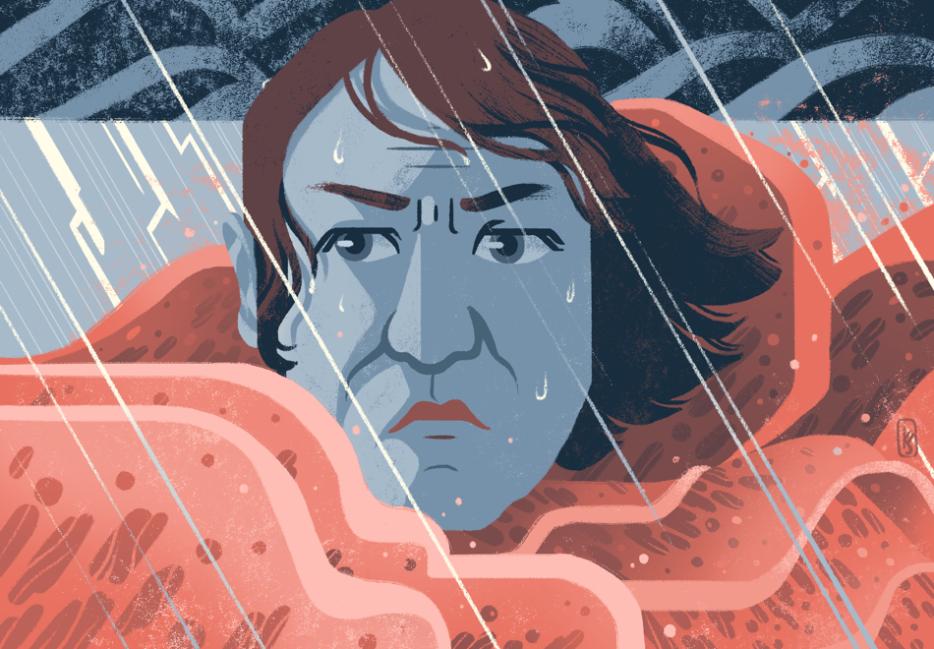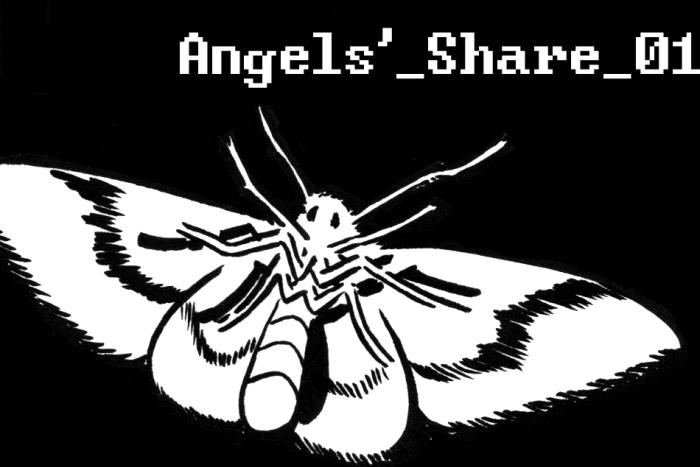The first time a girl ever called me pretty, she was absolutely stoned. Jessica from math class told me that my lips were beautiful, that my hair and my eyes were beautiful, and she handed me her headphones and asked me if I had ever heard the music of Elliott Smith. “He's amazing,” she said. “He's sad, like you.”
I was pretty sad back then. I spent a lot of time sitting in the corner of the school cafeteria, handling damp sandwiches and darkly wondering what a boob felt like. I played a baby in the school play, and when the unpopular girl playing my mother reached out to touch my spotlit face, someone shouted, unopposed, “Sasha's finally getting some action!” I wasn't actively planning to kill myself in the near future, but I sort of assumed I would, eventually. I was thankful that suicide was so vividly portrayed in movies and television.
I was pretty sad in 2003, but I wasn't sad like Elliott Smith. Smith was maybe the best melody writer since Schubert, but unlike Schubert, he was smoking crack to liven things up when his daily dose of heroin mellowed him out too much. That summer, Smith maintained a dizzying rotisserie of prescription drug habits, impressive even on the scale of a Los Angeles entertainer. He was still writing and recording beautifully, but in concert he was mentally disfigured. There's footage of his performances from this era, and I would strongly recommend you not watch it. In an attempt to get clean, he went to a quack Malibu detox doctor, who pumped him full of amino acids and sent him mewling into sobriety, where he encountered whatever the opiates were previously concealing. He stabbed himself a few weeks after I first heard his music, as I was staring down Jessica's lip-gloss.
Not knowing his biography, teenage me heard some of that suffering in his work. I heard someone who had lived a long time in a dark territory I was just starting to visit. I didn't like it. It scared me. I only became a fan years later, when I became truly, obnoxiously sad myself. I was working at a pizza restaurant and declaring my suicidal intentions during dinner service. “I think I'm gonna kill myself,” I said to Naomi. “This margherita is going to table 42.” I recently learned from William Todd Schultz's unfortunately named but fairly well-written biography, Torment Saint, that Elliott was fond of making similarly rash declarations. Before he left Portland for New York, he told his friends that they weren't responsible for what happened to him in Brooklyn—that they shouldn't blame themselves for what he had done. That's not a typo. He had started referring to himself in the past tense, as if he were haunting his own body.
*
There is probably no graceful way to say that I think Elliott Smith, famous musical suicide, may have been murdered. Yes, I'm afraid that I'm one of those people from the Internet. But, since the primary murder suspect in the case of Elliott Smith is Jennifer Chiba, his ex, I feel I should mention that I'm not one of these people who hates women for interfering in the lives of famous men—I have unconditional praise to offer Yoko Ono, and somewhat-conditional praise to offer Courtney Love. But there is a corner of his fanbase who are convinced that he didn’t take his own life, and I have to confess that this idea gives me comfort.
It's tricky to diagnose suicidal intent even in the living. Someone can express suicidal urges without possessing the commitment to fulfill them. Elliott Smith professed suicidal urges on numerous occasions, but so did I. (“I know you're not really suicidal,” my social worker friend said. “You're not fooling me.”) I find it frustrating and not at all fulfilling to, as I have, Google accounts of Elliott's late life, attempting to comb them for clues.
Strangely, the thought exercise I find more compelling is to ask whether I would have killed myself if I were Elliott Smith—whether his life was one I or anyone would want to survive from the inside. By the way, have you heard the music of Elliott Smith? As Jessica told me in math class—he's amazing; he's sad, like you.
It might be tricky for me to expand on that. An artist you love occupies a weird in-between place, where they're somehow a little more than a father, but a little less than a neighbour. They can permanently re-organize your consciousness but they can't sell you a Coke. You feel you know them more than anyone you actually know, which means that you don't really know a damn thing. I feel I know Elliott Smith, but if I picture him in front of me, I find myself picturing a tiny figurine, or Mount Rushmore. At five foot nine, he was slightly shorter than me, which feels incorrect.
Elliott Smith's death is a permanent moment of discomfort in my imagination, like a tattoo that healed a little blotchy.
Elliott Smith was born into a somewhat typical fucked up backstory—one slightly particular version of a kind of childhood that afflicts millions of people—which transformed into a highly atypical fucked up adult life, where he made a living by carefully enunciating the disgust his young life left him holding. For a living, he waded into the shit he was born into, and polished it into pearls. He had a sourceless displeasure that followed him everywhere, apparently unaffected by friendship, an Oscar nomination or anything else. Those close to him compared him to two widely celebrated archetypes of sadness: Eeyore and Kierkegaard. Someone you know is sort of like this—whether by genetics or Satan, they can't appreciate your love, or pizza. But that person you know probably isn't one of those monomaniacal artists, like Samuel Beckett, who got better at one thing than anybody else ever had. Smith’s thing was being the McCartney of Methadone. He wrote melodies as irresistible as car commercial jingles about dreaming of a disappeared lover from a pool of drool in a dive bar. He liked to play with dissonance, threading these infectious melodies over arrangements filled with sighing blue notes and dizzy chords—the effect is that of a graceful ghost, traipsing effortlessly through a ruin. He sang with faint but perfect pitch about being a sloppy failure, over tight, elegant arrangements played by an enviable backup ensemble—Elliott Smith on drums, bass, and piano. Imagine Gaudi carving cathedrals stuck all over with renderings of a naked, puking Gaudi. That's about the scale of what we're dealing with here.
Joan Didion famously wrote, “We tell ourselves stories in order to live.” I think she's right, but that it's frequently more to the point to say “we tell ourselves stories in order to stay inside watching Netflix and nursing our little sadness.” You know how this feels. Whether through isolation or cocaine or compulsive spending, we engineer the circumstances we believe we deserve. Significant sadness is a constant companion, rich with wordy speculation, full of invitations to hundreds of quiet evenings spent clutching a sweat-stained mattress.
You know how it feels to deprive yourself. But Elliott was a virtuoso of this kind of privation, on a scale beyond (at least my) capability. He funded the substance habits that accelerated his misery with the music about that misery. He was fascinated by self-destruction. One of his best songs, “Needle in the Hay,” is a paean to heroin he wrote five years before heroin ever touched his bloodstream. One of his girlfriends left him because, among other reasons, he couldn't shut up about wondering what it would like to be a heroin addict. Lou Reed once said: “You know, some people got no choice / and they can never find a voice to talk with that they can even call their own / So the first thing that they see / that allows them the right to be / why they follow it, you know, it's called bad luck.”
I tend to hold with neurobiologist Robert Sapolsky in the opinion that depression is the worst disease you can have. Cancer patients sometimes speak of the meaning that sudden mortality brings into their lives. The bizarre urge to continue being can drive people to even retrospectively enjoy the recovery from malaria, in that it provides a valley you can eye from subsequent happiness. The only thing that makes life worth living is your feeling that it is. Depression erodes that feeling with a powerful efficiency unmanageable even by bizarre, pervasive diseases of the skin. Elliott spent his life courting real depression, with great skill and fanatical devotion.
*
Some years before Elliott died, he jumped off a cliff. He didn't mean to kill himself then—not exactly. He started sobbing in a friend's car. When the friend tried to console him, Elliott leapt out of the car and bolted. It just so happened that the direction he chose took him to a precipice. He was drunk. He saw the edge coming, and thought, oh, I'm about to fall off a cliff, and the thought gave him no pause. Imagine this nightmare world: you wake up in the hospital with a nasty puncture wound after jumping, and as you lie there, itching your bandages, you think, I could turn this into a tight little couplet.
So you do—you write “Division Day,” an irritatingly catchy jumper's anthem that Katy Perry could turn into a #1 hit, provided her team re-wrote all the words about being “naked except for a perpetual debt that couldn't be stripped away,” or the ones about being “a grown man dying from fright,” or the ones about “flying to fall away from you all.” Listen to it twice, and you'll find yourself singing it in the shower, shampooing yourself to a depiction of approaching terminal velocity above a freezing ocean.
I find it very difficult to live in a world where Elliott Smith maybe killed himself, though I know that's the only reasonable option.
“Division Day” is a great microcosm of the problem of Elliott Smith's existence—the problem with having a way to make your suffering bearable is that you then have a way to make your suffering bearable. Former addicts of all kinds speak of the importance of bottoming out. You get to a place where your habit can no longer be seen as aesthetic—not a hobby, but a way of life. Maybe you're down to pawning stolen garden gnomes to get your Dilaudid. But in Smith's life, all suffering was instantly transformed by his prolific musical mind, remaining aesthetic by definition. Smith wrote, as far as I can tell, exactly two prevailingly happy songs. If being Elliott Smith sounds like a repetitious, stupid way to live, it might be helpful to know that Smith shared your disdain. He had a lot of insight into his condition. It just didn't help.
This insight reaches its peak in “King's Crossing,” which is, I feel, Smith's best work. It's also his most horrifying. The intro is so pretty that when I listen to it I can't feel my legs. From sinister mumbling comes a cloud of inbent melody which clears abruptly over retro electric ragtime piano, playing a figure equally nostalgic and martian. Do you ever come to a moment of awareness where you look coolly around yourself and go, “I guess this is my fucking life?” Elliott Smith, in “King's Crossing,” auditions himself for the role of himself—“read the part and return at five,” he sings, “it's a hell of a role if you can keep it alive.” He realizes that he's a caricature of his own worst tendencies, played out for the benefit of his handlers, that “the method acting that pays [his] bills keep the fat man feeding in Beverly Hills.” He knows the part very well, to the point that he can clearly see its logical final act—“I've seen the movie,” he sings, “and I know what happens.” What happens is his dealer arrives (his dealer is, hilariously, compared to Santa Claus) bearing heroin that lands Smith in a hospital where “time reverses and dead men talk to all the pretty nurses”—he is talking about himself, once again, posthumously. Amidst all this, he sings “gimme one good reason not to do it,” over a chorus of his own overdubbed falsetto pronouncing a long, evolving, wordless vowel. Go ahead—he's asking you a question.
*
When I'm thinking about Elliott Smith, sometimes I'm also thinking about how suicidal doesn't necessarily mean suicide. I hope you can't relate to me at all when I say that suicidal can be a place where you can live for a long time. Not the act of suicide, of course, but suicide as a framework for living. Apologies for the Nietzsche quotation: “The thought of suicide is a great consolation: by means of it one gets through many a dark night.” It's so fucking true, though. You can endure a lot of torment by silently imagining how everyone you know will react to the news of your hanging. You can privately curate a list of bridges, balconies, and likely last words. Despite everything you're helpless to change—acne, poverty, your central perversion, whatever—with suicide your control is, in the most literal sense, final.
Elliott Smith actually would rarely sing about committing suicide. Most often he sung about being cynical—about the disappointing future sprawling before him. His most romantic song, “Say Yes,” is about feeling philosophical and grown up about losing the love of your life. The central difference between a cynic and a suicide, I think, is that the cynic believes that life is definitely worth barely living. A real cynic is ravenous for more romantic frustration, more stupors, more cigarettes. Cynicism offers an inverted version of the comfort of religion—it saturates everything with shitty meaning.
In “Waltz 2,” Smith sang, “I'm never gonna know you now, but I'm gonna love you anyhow.” The line is specifically about his mother, but it feels more general. It feels like the song of someone who more easily loves people he doesn't know—who can only truly adore people whose love he hasn't had the chance to sabotage. It feels like the lament of someone in an exclusive relationship with their prideful despair—someone who watches drunks stumbling from a packed club, thinking, “I wish I could be one of those morons.” I know people like that. I used to be one of them. I maybe still kind of am. We don't die—we'd hate to confirm our suspicions of your suspicions of our weakness—we live to prove you wrong. Elliott always maintained that he loved making his music, even as his music usually claimed that he didn't love much at all.
One of Elliott's last songs, “Suicide Machine,” is about being really annoyed that people think you want to kill yourself. The song's lead vocals were recorded the day before his death. A lot of people thought Elliott might not make it. That makes murdering Elliott Smith the perfect crime. The day that he died, blood was smeared all over Elliott's house. Responding to allegations that Elliott's death was suspicious, Jennifer Chiba told the press that she and Elliott's family knew the truth—that he definitely killed himself. His blood relatives summarily issued a press release clarifying that she was not, in fact, speaking on behalf of the Smith family. She subsequently sued them for a portion of the estate. Having taken first aid, I know that you shouldn't pull a sharp object out of a wound. Jennifer Chiba, having taken first aid, certainly knows that too, and yet she pulled Elliott's knife from Elliott's wound.
I know this is all totally crazy. But I can't help it. Elliott Smith's death is a permanent moment of discomfort in my imagination, like a tattoo that healed a little blotchy. The human mind is terrible at tolerating ambiguity. I find it very difficult to live in a world where Elliott Smith maybe killed himself, though I know that's the only reasonable option.
The secondary tragedy of a completed suicide is how it can make someone's whole life seem like a suicide in progress. An acquaintance of mine committed suicide a few years after we played basketball one summer. Absurd things have happened to my memories of that game—I've tried to search my recollections of his dribbling for symptoms of lovelessness. I can't help but feel there was some melancholy behind his gorgeous smile that day, even knowing, as I do, that in all likeliness all his smile concealed was the neural substrate of basketball. Similarly, I find myself engaged in wild, astrological supposing whenever I listen to Elliott's music—wondering whether one can hear suicide in the swooning upper voice of a harmony.
*
There's no real beginning or end to this story I'm telling you, but I went looking for one at the house where Elliott Smith died, in Echo Park. I wasn't in Los Angeles to pay my respects—I was there because I had one of those impossible love affairs that bring you up against the walls of your life only to discover that they're as durable as dead leaf. The relationship started in Toronto, then attained a silly level of sincerity over Skype. We agreed that I had to fly out to California to see if the love we had was real. It wasn't, quite. We agreed as much one evening over a bottle of pinot noir that tasted like mouldy lipstick. We didn't really want to look at each other so I went walking to the CVS to grab some toilet paper. It was raining approximately seventeen drops of rain—the piteous rain of a prolonged drought—and I was in a bleak mood, the kind of mood where you Google “elliott smith death house echo park address suicide murder,” and discover that you're right in front of the house where Elliott Smith died. It was on the way to the toilet paper, maybe three hundred meters from where I was staying.
Elliott Smith's house is a box. It's a box on Lemoyne Street, a lovely diagonal stroll between mature oak and olive trees, punctuated by guard dogs saying hello from behind fences hiding the human sources of clouds of high-grade THC. You can walk down a secret staircase past a tiny fruit orchard, down to the corner of Echo and Sunset, where there are dollar tacos and three dollar hot dogs with onion salad, cooked with bacon fat in divoted skillets. You can get mugged, as I did, by skilled American muggers, who will disabuse you of your funds quickly and painlessly.
Elliott Smith’s house is not a box that bespeaks musical mastery. It's not particularly suggestive of darkness or misery. Certainly there are no bloodstains. You don't even feel a well-defined lack, as with a hollow being prepared for a skyscraper's foundation. You may see, as I did, the silhouette of a person gazing back at you from the window, a person used to people gawking with ill-defined facial expressions at the box where Elliott Smith died.
You hear people talking about closure, or letting go. “Letting go is the only sane way to live,” a Buddhist once monk told me, shortly before claiming he could cure diabetes with a massage. I appreciate the sentiment, but I think the language is weak. “Closure” offers the metaphor of the past as a music-box with a delicate, delicately closing clasp. “Letting go” implies that the past is a kite I'm hesitating to give to the air it prefers. Maybe it's like that for you. For me, though, adult life is full of an unknowing that is not at all like a charm or a kite. Something very bad happens in Syria that you don't even notionally understand. Your friends disappear to other cities, or to consuming careers, or they just disappear—it's impressive, how easily and totally people can vanish. There's this fog of unknowing that surrounds you, and, sometimes, you see a face staring back at you from inside. Elliott Smith was in a dream I had last week. He was off to the side of a distended greenhouse, half-obscured by a stand of tall white grass, looking like he was searching for something.
Increasingly I find myself turning to the past and saying, I love you, but I wish you would just shut up.






